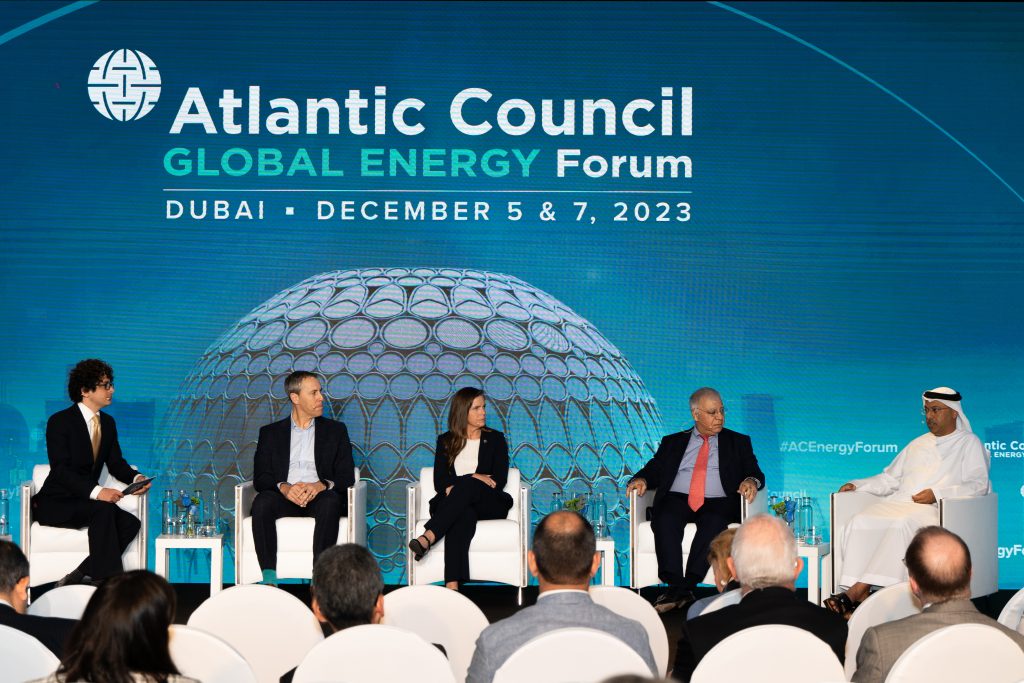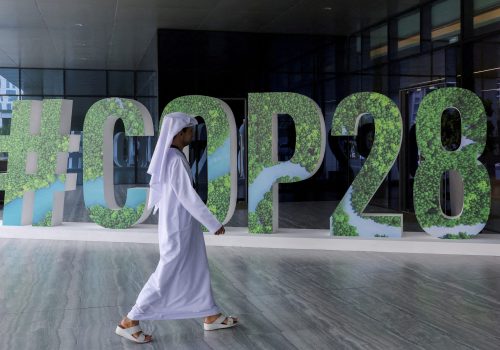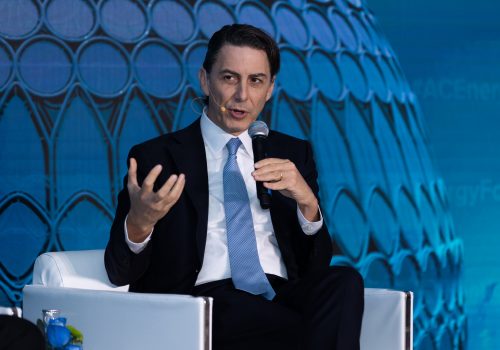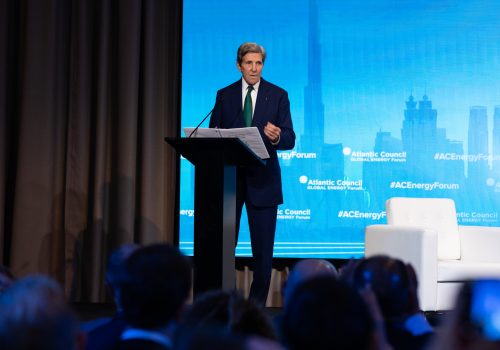Global policymakers and leaders will have to act quickly to pave the way for innovation if they want any chance of meeting their lofty 2030 decarbonization goals, industry leaders warned on Thursday at the Atlantic Council’s Global Energy Forum in Dubai, which is currently hosting the United Nations climate change conference known as COP28.
“The stark contrast to me is that energy companies are actually here, and two COPs ago at Glasgow, there were CEOs of oil companies who were told they were not permitted to attend,” said HIF Global Executive Director Meg Gentle, adding that energy company executives’ voices are sorely needed in these conversations about fighting climate change.
“It’s getting better, but policymakers don’t really listen to industry leaders,” said Gentle, whose company makes synthetic fuels from renewable energy. “And they underestimate how long it takes to build these projects. We’re futzing around with getting things perfect, rather than getting things moving.”
That urgency was felt across the panel. Gentle was joined by Jon Mitchell, chief sustainability officer at Canadian energy company Suncor; Naser Al Hajri, deputy chief operating officer of Abu Dhabi-based Mubadala Energy; and Fareed Yasseen, climate envoy and advisor to the prime minister of the Republic of Iraq.
See more highlights below from their discussion, which was moderated by Cody Combs, future editor for the National.
Energy innovation at work
- Gentle said that e-fuels, which are made from green fuel and recycled molecules of carbon dioxide, already have significant promise in addressing the climate challenge. While they are still more expensive than producing fossil fuels, they are chemically identical to what’s being put in car and jet fuel: “What we need to do is create the policy and the market mechanisms that can extend and accept e-fuels into the market and use it in existing infrastructure,” she said, describing it as a public policy and economic challenge more than a technological one.
- In Chile, HIF Global is producing an e-methanol that can be used for the shipping sector and synthesized into gasoline. Chile can start reducing fossil fuel dependence by blending that e-methanol with other fuels, which adds only “a couple cents’ increase in the cost,” Gentle said, proving that the world can start creating “different market mechanisms where pricing can be spread over large markets.”
- Mitchell said that Suncor has started taking more of a focus on the demand side of the energy technology equation. “We’re in a situation where we need significantly more energy with significantly less emissions. And so how are we going to do that?” Mitchell said. “Demand’s been a bit absent from the conversation. And I think we need to spend a little bit more time on that.”
- There are numerous questions about whether noncombustible uses of fossil fuels and hydrocarbons can provide an alternative product mix for energy companies. Al Hajri gave the example of a geothermal project that Mubadala Energy recently conducted with Chevron to provide sustainable energy to a town in Indonesia. “All forms of energy will be required,” he said.
- Yasseen argued that nuclear technology needs to get more attention. “We can’t have just one arrow in our quiver. We really have to broaden what we do,” he said. “There are significant developments that make nuclear reasonable and achievable and safe within our lifetimes,” he added. Those developments include novel ways to yield nuclear ashes with one hundred-year lifetimes instead of one thousand-year ones, making it possible to solve the challenge of nuclear waste, and fusion advances that have made commercial solutions a possibility by 2035 or 2040.
Changing the clean energy conversation
- Many on the panel observed a marked shift in the conversations at COP28 compared to past years. “For years we’ve been pushing a rock up a hill trying to get people to understand, notice, pay attention to this issue,” Mitchell said. “It feels to me like we’ve crested that hill. The rock is now rolling down the other side, and now we have to harness the momentum on where we want to take it,” he said, noting that there were almost one hundred thousand people in attendance this year, more than double last year’s attendance. “I think COP28 can do, for the energy sector, what Glasgow did for the financial sector,” he said.
- In order to reach 2030 sustainable development goals, the multi-year projects required to build novel energy technology facilities need to get started now, Naser argued. “In my industry, it can take five, six, seven years sometimes to get the projects ongoing,” he said. “Everyone is talking about the long target, but I think what we need is a short-term and medium target.”
- Gentle described an e-fuels facility HIF Global is building in Texas, where the construction process will take at least four years.“ So the longer we wait on policy to allow these projects to start,” she said, “the lower probability we have of delivering solutions before 2030.”
New technologies confront new realities
- Yasseen said that taking action should put ethics first. “The driver to everything that we do should be equity,” he said. “You can’t, for example, force people to switch to new technologies if it’s very costly to them. You have to take circumstances into account,” he said. “So the focus now, for example, in Iraq, is not on carbon capture and storage, but on stopping flaring.” It’s not about hydrogen, he said, “but it’s about taking account of methane.”
- Asked about whether Iraq had the political will to resolve some of these issues, Yasseen said that the prime minister recently told a friend in a private conversation that the biggest thing that kept him up at night was flaring. “In Iraq, it is a health hazard to people,” he said. “Frankly, it’s money that we’re wasting, huge amounts. And it’s bad for the planet.”
- The Global Methane Pledge, Al Hajri said, will “provide us a dynamic to work with vendors, to work with partners, operators, different sectors, and to try to see what kind of technology that we can implement in our facilities.” Globally, there are lots of opportunities to use existing facilities to help in the long term too, Mitchell added, noting that the same storage infrastructure used to decarbonize oil production can be used to store carbon dioxide with carbon capture and storage technologies as they advance.
Nick Fouriezos is a writer with more than a decade of journalism experience around the globe.
Note: Mubadala Energy and HIF Global are sponsors of the Atlantic Council’s Global Energy Forum. More information on Forum sponsors can be found here.
Watch the full event
Further reading
Thu, Nov 30, 2023
Expert analysis: The successes and shortcomings in the fight against climate change at COP28
New Atlanticist By
Our experts dispatched to Dubai, where they analyzed how global leaders responded to the greatest challenges posed by climate change.
Thu, Dec 7, 2023
The White House’s Amos Hochstein on ensuring energy security amid global crises
New Atlanticist By Daniel Hojnacki
At the Atlantic Council Global Energy Forum in Dubai, Hochstein discussed the United States’ vision for the future of energy security.
Wed, Dec 6, 2023
John Kerry unveils a ‘critical’ new US strategy to expand fusion energy
New Atlanticist By Katherine Golden
"We need to pull ourselves together with every strength we have,” Kerry said on the first day of the Global Energy Forum.
Image: A discussion on technological pathways to accelerate decarbonization goals at the Global Energy Forum in Dubai, December 7, 2023.



